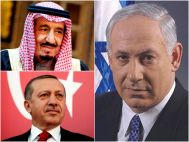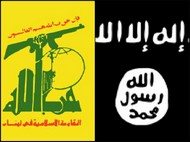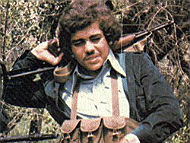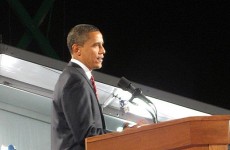 The Saudi-Iranian clash may portend a changing map of alliances in the Middle East.
The Saudi-Iranian clash may portend a changing map of alliances in the Middle East.
IsraCast assesses what might soon emerge in light of Iran’s ascendancy that has been bolstered by its nuclear deal with the U.S. and what is perceived as Obama’s deference to Tehran in Riyadh. At home, the terror attack that killed two Israelis in the center of Tel Aviv leaves some key unanswered questions.
He was the lone wolf terrorist who got way. On Dec. 1, a 31-year-old Israeli Arab, walked calmly along Dizengoff Street, the heart of Israel’s ‘fun city that never sleeps’- he looked like everyone else. Except for one thing – Nashat Milhelm had a Falcon sub-machine gun hidden in his backpack! It was a quiet Friday afternoon. The shopping area was filled with shoppers and young Israelis, winding down at the end of the workweek by meeting with friends in local bars. In one of them there was a birthday party going on.
Two young men are killed. One, a combat veteran, survived the last war in Gaza only to be shot dead in a friendly Tel Aviv bar at a birthday party. Eight others are injured.
After picking his target, Milhelm goes into a store, fills a bag with nuts, goes to the cashier, apparently changes his mind and then walks back and empties the bag very carefully into their container. He has been ‘casing’ the situation. Apparently satisfied, he then walks back to a row of shopping carts near the street door. He takes off his backpack and casually takes out the sub-machine gun. Then he darts into the crowded street and starts spraying Israelis with machine gun fire. Pandemonium. People run for their lives, those in the bars fling themselves to the floor as the bullets shatter the windows. Two young men are killed. One, a combat veteran, survived the last war in Gaza only to be shot dead in a friendly Tel Aviv bar at a birthday party. Eight others are injured.
Video coverage from the store clearly shows the unmasked face of the killer – it was as if he didn’t give a damn. At least one Israeli civilian was armed with a private handgun but he was paralyzed by shock. Several eyewitnesses gave chase after the fleeing assassin, but unarmed you cannot close in on a sub-machine gun with only your bare hands. Then the rest gets sketchy. A few streets away, Milhelm got into a taxi, which drove off. However the driver, by chance another Israeli Arab, apparently realized that Milhelm was the cause of the gunfire he had heard and refused to cooperate. He was also shot to death. The family of the murdered Israeli Arab is also looking for the killer to settle the score.
There is still no sign of Milhelm, and it may be that he has escaped to the Palestinian West Bank…
But Milhelm has simply disappeared into thin air. So this cold-blooded lone wolf is also as crafty as a fox. Downtown Tel Aviv was swarming with policemen who had a description of the fugitive but failed to find him. The plot thickens. Milhelm knew the city well. He had worked as a deliveryman so maybe he had holed up in an empty apartment, which he had prepared in advance. This required security officials to conduct a massive building-to-building search. Eight days later the Israeli police and the Shabak security service, which have done yeoman service in coping with the current wave of terrorism, have been stumped. There is still no sign of Milhelm, and it may be that he has escaped to the Palestinian West Bank, which obviously complicates the situation.
Method in Milhelm’s madness…
Did he have help? The police have questioned his relatives – his father turned out to be an Israeli volunteer policeman who had a license for a weapon. The attacker had stolen that gun to go on his shooting spree! Go figure. But Milhelm Jr. was not a known member of a radical Palestinian organization. However, he did serve time for trying to grab the rifle of an IDF soldier. The judge reportedly let him off with a light sentence after a psychiatric assessment that he was demented. Milhelm’s family and former teachers concurred that he was a little ‘off his rocker’. But he was not deemed to be a real threat, and apparently was not on any Shabak watch list. Otherwise how could he have worked as a deliveryman in Tel Aviv with access to just about everywhere?
It’s still early days, but one thing is striking. The Shabak and police were able to quickly identity the attacker. On seeing his son’s face on TV, Milhelm Sr. immediately informed the police. In such terror attacks, the common procedure is for the police to immediately seal off a city or town to prevent the terrorist from getting away. In this case, Milhelm was apparently able to slip through the dragnet. So was it tight enough? How his father was licensed to keep a weapon at home, even though his son was more than a little weird and had served time will also be investigated when the dust settles. And although Tel Aviv has been the target of terrorism in the past, the fact that the killer has managed to get away so far has been unsettling for many residents.
But Israeli security officials are quick to plug loopholes. For example, policemen and IDF soldiers are equipped with flak jackets that also protect them from the terrorists’ knives, the main weapon of attack. But those jackets still leave the neck and throat vulnerable, so the attackers have started aiming for those points. The Israeli response is to provide security personnel with a specially designed plastic protector to cover the neck and throat areas.
In one bizarre case, an Israeli company has also devised protective shirts made of special fabric that was supposed to protect its wearer from a stabbing. However, when a TV reporter volunteered to undergo a test on just how knife resistant it was, he wound up with a shallow stab in his back. But after the company rushed him to the hospital for some stitches he was fine. The company says the shirt is still in the experimental stage and more work needs to be done.
Prime Minister Netanyahu criticized the prevalence of weapons held illegally by Israeli Arabs in their communities.
Visiting the scene of the attack, Prime Minister Netanyahu criticized the prevalence of weapons held illegally by Israeli Arabs in their communities. Bibi promised to take action, saying he would no longer agree to Israel being comprised of two states one abides by the law on weapons while in the other (Israeli Arab) people do what they want. This sparked a sharp reaction from Israeli Arab Knesset Members and leaders of Arab localities. They retorted that they have long demanded that the Israeli government crack down on the large quantities being held illegally, often by criminals, in their communities. They argued Israeli Arab citizens are the first ones to be endangered by those illegal weapons. And they added that when Israeli Arabs were being shot by other Israeli Arabs the government did not do anything. But now that Israelis were being killed and wounded by those same guns, Netanyahu was going to take action.
It will now be interesting to see if Israeli Arab politicians will really support a government operation to confiscate the illegal weapons in their communities or whether they were just bashing Netanyahu. In fact, there is a tradition of Israeli Arabs possessing clandestine weapons – they often fire them into the air at weddings – it adds to the celebrations. They are also used in blood feuds between rival families. In any case, Israeli Arabs have not really joined the current wave of Palestinian violence that erupted last September. IDF Gen. (ret.) Yaakov Amidror, a prominent intelligence expert, sees it this way:
“It is worth noting the very minor participation of Israel Arabs in the wave of terror. So far only three Israelis (Arabs) have committed attacks. In more than four and a half months, out of a population of 1,500,000 Arabs, only two used knives and one a gun – this is truly a drop in the bucket. It is necessary to leverage this situation and enable Israeli Arabs to enjoy even more what a state of law and order, a real and developed democracy like Israel, can provide for its citizens. The refusal to carry out terror is another sign of their participation in Israeli society. This must be praised and the process accelerated. Having said so, this does not guarantee that they will not join the wave of terror in the future. It is necessary to work hard and wisely to ensure that their role in terror does not increase and lead to an explosion.”
But as a rule, a ‘successful’ terror attack energizes other terrorists to follow suit and join in the action. They revel in the bloodshed of Israelis. Hamas has ordered its activists on the West Bank to escalate their violence – Hamas can urge its members to take Milhelm as an example of how much havoc one terrorist can do. Shabak has just smashed a cell of six Hamas terrorists who were plotting to carry out a kidnapping and murder strike similar to the attack that killed three Israeli youths in June 2014.
Saudi-Iranian cauldron boiling…
The Sunni-Shia rift in the Middle East is close to the boiling point. It pits the two greatest protagonists one against the other. Shiite Iran, now bolstered by its nuclear deal with the U.S. has stepped up its subversive activities not only in Yemen, but also inside Sunni Saudi Arabia itself. The flashpoint has been Saudi Arabia’s Eastern Province, where Shiites are a majority. Moreover, they were led by a firebrand Ayatollah, Sheik Nimr al Nimr, who, with Iran’s backing, fomented revolution against Riyadh.
The Saudi leaders, who now suspect the U.S. is favoring Iran after the nuclear deal, have taken the bull by the horns and beheaded not only Nimr but also another forty of his cohorts. The Ayatollahs in Tehran have hit the roof and vow to avenge the execution of a fellow Ayatollah cleric. The rest of the Middle East watches from the sidelines, as these two size up each other. Egypt, Jordan, and nearly all the Gulf states side with Riyadh. Syria’s President Hafez Assad, an Alawite that is recognized by Shia Islam, backs Tehran, for what that’s worth.
So where does that leave Israel? Seeing as how Jerusalem and Riyadh both view Tehran as a mortal danger, this opens the door not to a beautiful friendship but to some hard-nosed geo-strategic understandings. The latest fireworks will undoubtedly reinforce this trend, which both sides will keep in the shadows for obvious reasons. But not only Saudi Arabia, but also Turkey and President Recepp Tayyip Erdogan are also taking a more balanced approach to the Jewish state. Always full of surprises Erdogan, traveled to Riyadh to consult with King Salman. Guess what they discussed behind closed doors? Erdogan, the leader of Sunni Turkey, most likely concurred with Salman on the need to stand up to Iran’s quest for regional hegemony. But on the flight back home, Erdogan did make another major pivot in his anti-Israel stance. In effect, Israel and Turkey needed each other:
“Israel is need of a country like Turkey in the region. We have to admit that we also need Israel.”
This is no less than jaw dropping. The question is why did Erdogan, who even stooped to near nigh anti-Semitic insults in the past, now find Turkey in need of Israel? Certainly not because of Netanyahu’s clout with Obama! So why would Turkey and why would Saudi Arabia be in need of the Jewish state? That’s right, Iran!
The Obama administration has adopted a policy of appeasement toward Iran. The only thing that counts is that Tehran must keep its part of the nuclear deal until next January when Obama leaves the Oval Office. The Iranians can launch ballistic missiles, and the Revolutionary Guards launch missiles to within one mile of U.S. vessels in the Gulf and Washington will mumble some diplomatic jargon and then look the other way. So when you have a very powerful and fanatical Shiite regime bent on building nuclear weapons when the time is right, it is only natural that Sunnis will be closing their wagons and even letting Israel in, if it can more than pull its weight. During the recent furor between Netanyahu and Obama on letting Iran keep its nuclear weapons facilities, Saudi Arabia was rooting for Bibi.
Another question now arising is whether Israel, Saudi Arabia and Turkey may now be playing with the idea of forming a quiet alliance to take on Iran in the future? The very idea should give the Ayatollahs something to think about.
Throughout the Middle East, many leaders have been scratching their heads over President Barack Obama’s policies in the region. First and foremost, there was Washington’s support for the Muslim Brotherhood, which nearly turned Egypt into a radical Islamic State. It followed the failed model of former President Jimmy Carter who helped depose the Shah in favor of Ayatollah Khomeini and his successors, who have not only crippled the country, but also spread so much bloodshed both at home and abroad. Former U.S. Defense Secretary Robert Gates is now quoted as saying that it wasn’t all Obama’s doing – he was spurred by his young and inexperienced aides such as Ben Rhodes and Samantha Power, who in Gates’ words were ‘dangerously naive’.




